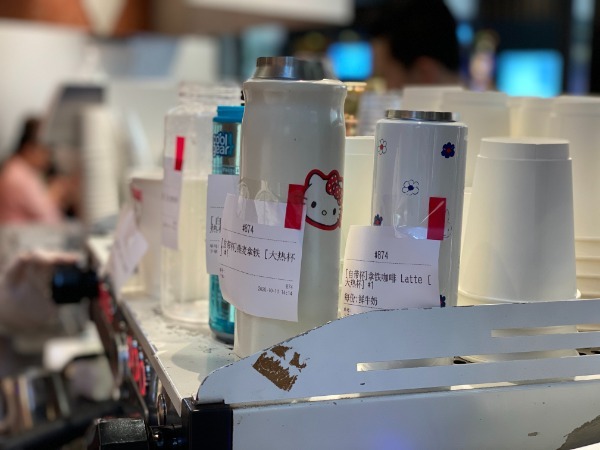 |
|
Cups belonging to consumers are seen in a cafe in Shanghai.[Photo by He Qi/China Daily] |
According to Zhang Ling, founder of Writer Coffee, nearly two-thirds of her customers bring their own cups.
"In the beginning, it was mostly foreign guests who brought their own cups because they're used to doing so. Later, more Chinese started to do the same as we have been promoting the discounts that they can enjoy if they do so," says Zhang.
Writer Coffee currently offers a 5 yuan discount to guests who consume their coffee using a mug from the cafe. It also loans cups to customers who prefer not to use the disposable option.
To date, one-fifth of Writer Coffee's customers choose to leave their cups in the store.
Zhu Yifan, 32, who works in an office located near Writer Coffee, leaves her cup in the store every day after work and picks it up in the morning before work. What motivated her to carry out this practice are the garbage-sorting measures and empty-plate movement, or anti-food-waste movement, that the government has been promoting in recent times.
According to a China Central Television survey last year, Starbucks uses 4 billion disposable cups that require 1.6 million trees to make each year. The survey also lists some fast-food chain enterprises, which sell a large number of cups of beverages.
While the survey points out that most consumers would dispose of these cups into the recyclable section of rubbish bins, a garbage-collection station in Beijing says that wet and dirty paper cups will not be recycled.
"In order to improve its anti-osmosis and strength, we paste a layer of plastic on the cups so that it became a composite paper product, and this interferes with paper recycling. The cost of separating the plastic from the paper cup is very high," Tsinghua University environment professor Liu Jianguo tells China Central Television.
"We can only try to avoid the use of such cups in the first place. If we have to use it, then we use it as many times as possible to prolong its service life."
Other countries around the world have also set their eyes on reducing the use of disposable paper cups and encourage people to use more environmentally options.
For example, Ireland's environment minister announced in November 2019 that consumers who use disposable cups will by 2021 be subjected to a "latte tax".
It was also reported that the United Kingdom uses 2.5 billion disposable paper cups a year, almost none of which are recycled. For this reason, British legislators have called for a tax on paper cups as they believe that manufacturers of these products should pay more.
The UK's House of Commons Environmental Audit Committee had also urged the government to set a goal of recycling all disposable cups by 2023, failing which an outright ban on such products should be put in place.
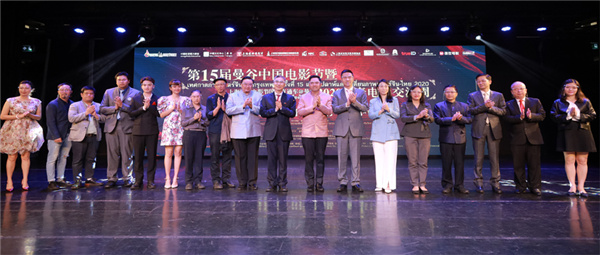 |
The 15th Chinese Film Festival in Bangkok and the 2020 China-Thailand Film Exchange Week opens at the China Cultural Center in Bangkok on Oct 25, 2020. [Photo provided to Chinaculture.org] |
On Oct 25, the opening ceremony of the 15th Chinese Film Festival in Bangkok and the 2020 China-Thailand Film Exchange Week was held at the China Cultural Center in Bangkok. The event was hosted by the China Cultural Center in Bangkok and received strong support from the Chinese Embassy in Thailand and the Thai Ministry of Culture.
The COVID-19 pandemic doesn't impede the enthusiasm for cultural exchange between China and Thailand. This film festival uses live broadcast to present the opening ceremony and host the "China-Thailand Film Exchange and Cooperation Online Seminar". During the film festival, audiences can use the online platform of the China Cultural Center in Bangkok to watch films online, which greatly increases the global reach of the festival.
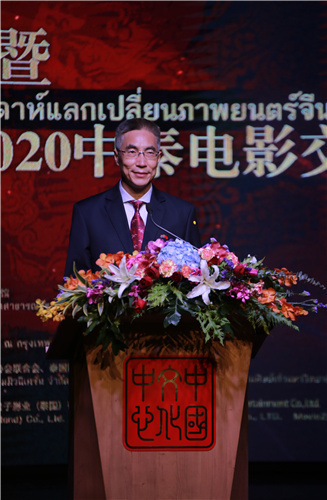 |
Gu Hongxing, director of the China Cultural Center in Bangkok and China Tourism Office in Bangkok, speaks at the opening ceremony. [Photo provided to Chinaculture.org] |
Gu Hongxing, director of Bangkok's China Cultural Center and China Tourism Office, said film can not only introduce one's national culture, but also reflect unique social landscapes. Film has become an important part of cultural exchange between countries and enhance mutual understanding among people around the world.
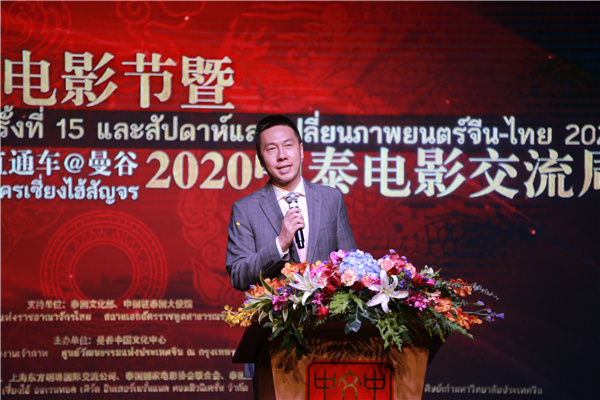 |
Yang Xin, Chargé d'affaires of the Chinese Embassy in Thailand, speaks at the opening ceremony. [Photo provided to Chinaculture.org] |
Yang Xin, Chargé d'affaires of the Chinese Embassy in Thailand, said since the establishment of diplomatic relations between China and Thailand 45 years ago, the mutual trust between the two countries has continued to deepen, economic and trade cooperation has expanded, cultural exchanges have become closer, and all-around cooperation has achieved fruitful results. Both China and Thailand have a vast film market. As a traditional project of cultural exchanges between China and Thailand, the Bangkok Chinese Film Festival has laid a solid foundation for film cooperation between the two countries for 15 years and will add new drive to the promotion of cultural exchanges and cooperation between China and Thailand.
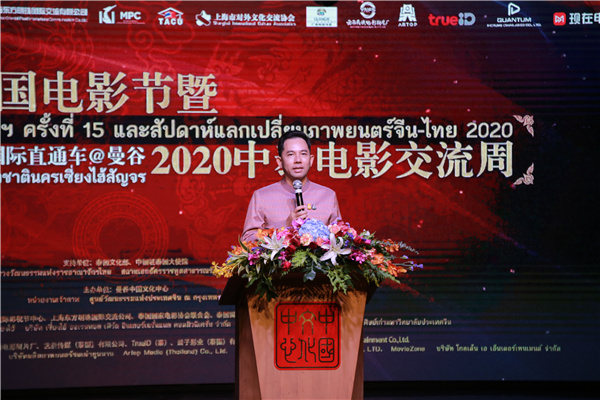 |
Itthiphol Kunplome, Thailand's minister of culture, speaks at the opening ceremony. [Photo provided to Chinaculture.org] |
Thailand's Minister of Culture Itthiphol Kunplome said in his speech the governments and people of Thailand and China have been in constant exchange. Cooperation in various fields has developed steadily, and the film festival is another important event to further promote cultural exchanges between the two countries. The people of the two countries can promote their understanding of the cultures of both sides through films, and promote friendly relations and cooperation in other perspectives.